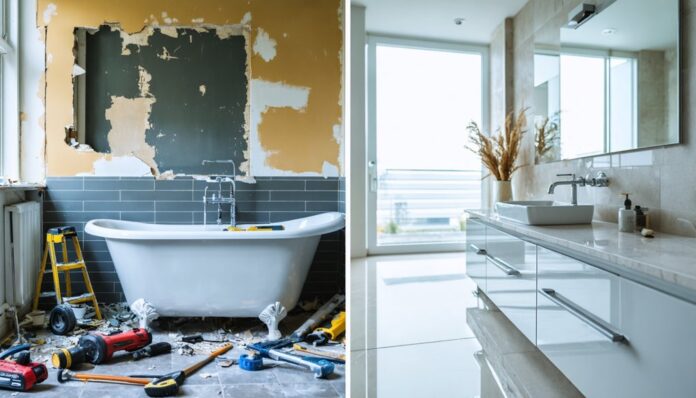Deciding between a DIY or professional approach to bathroom renovation involves various considerations, from personal skills to budget constraints. Each path offers distinct advantages and challenges. While DIY projects allow for personal expression and cost savings, they can be fraught with risks, especially in areas like plumbing. Conversely, professionals assure quality and adherence to regulations. Understanding these dynamics is crucial before making a choice that significantly impacts your home's value and functionality.
Evaluating Your Skill Set and Experience
When considering a bathroom renovation, assessing one's skill set and experience is crucial to determine if a DIY approach is feasible. A person must reflect on their past projects and the complexity of tasks they have successfully completed.
This introspection allows them to gauge their capability to handle intricate plumbing, electrical tasks, and precise tiling. A sense of liberation arises from knowing one's strengths and limitations, guiding them to either embrace the challenge or seek professional help.
For those with a passion for learning, the prospect of acquiring new skills can be exhilarating and empowering. However, understanding the potential risks and recognizing when a task exceeds one's expertise is essential.
This awareness fosters confidence, ensuring the renovation journey aligns with their abilities and aspirations.
Assessing the Scope of the Project
Before embarking on a bathroom renovation, it is imperative to thoroughly assess the scope of the project. This crucial step empowers individuals to understand the complexities involved and make informed decisions.
It begins with evaluating the existing condition of the bathroom, identifying what elements need replacement or repair. Considerations should include the size of the space, structural modifications, and the desired aesthetic outcome.
Identifying potential challenges, such as plumbing or electrical work, is vital to avoid unexpected hurdles. Assessing whether the project requires permits or adherence to building codes ensures compliance and safety.
Budget Considerations and Financial Implications
Once the scope of the bathroom renovation is clearly outlined, attention naturally shifts to budget considerations and their financial implications.
A DIY approach often appeals to those seeking control over costs, allowing for adjustments and savings on labor. It empowers individuals to explore cost-effective materials and innovative solutions without the constraints of professional fees.
However, unexpected expenses can arise if inexperienced hands meet unforeseen challenges.
Conversely, opting for professional services generally involves a higher upfront investment, yet it offers predictability and expertise, potentially preventing costly errors.
Weighing short-term savings against long-term value is crucial. Each path offers financial freedom in distinct ways: DIY provides flexibility, while professionals offer peace of mind.
Ultimately, the choice hinges on aligning financial realities with renovation aspirations.
Time Management and Scheduling
Efficient time management and scheduling are pivotal in determining the success of both DIY and professional bathroom renovations.
For the DIY enthusiast, balancing personal time with renovation tasks can be liberating yet challenging. They must carve out dedicated hours amidst daily routines, often stretching the project timeline. Flexibility is key, allowing them to adjust as unforeseen issues arise.
Conversely, professional contractors offer structured timelines, providing a clear schedule that liberates homeowners from day-to-day involvement. Their expertise ensures a streamlined process, minimizing delays and maximizing efficiency. However, homeowners must coordinate closely to ensure timelines fit their schedule.
Ultimately, choosing between DIY and professional services hinges on one's ability to manage time effectively against personal freedom and the desire for a predictable schedule.
Quality of Work and Finishing Touches
When evaluating bathroom renovations, the quality of work and finishing touches play a crucial role in the overall satisfaction with the project. A professional renovation often promises precision, with skilled tradespeople ensuring that every corner is immaculate and every fixture is flawlessly installed.
Expertise can translate into a polished outcome that fulfills the vision with minimal hassle.
In contrast, a DIY enthusiast may find liberation in the creative process, tailoring each detail to their unique taste. However, this freedom comes with the challenge of mastering techniques and problem-solving on the fly.
While DIY projects can achieve personal satisfaction, they risk imperfections that detract from a pristine finish. Ultimately, the choice hinges on whether one values guaranteed quality over the freedom of personal expression.
Navigating Permits and Regulations
How essential is it to understand the complexities of permits and regulations in bathroom renovation? For those seeking the freedom of DIY projects, navigating these legalities can feel daunting yet liberating.
Comprehending local building codes and obtaining necessary permits is crucial to avoid future complications and potential fines. While DIYers relish autonomy, they must ensure compliance with health and safety standards to protect themselves and future occupants.
On the other hand, professionals often have an intimate knowledge of these regulations, streamlining the process and offering peace of mind. They handle paperwork and ensure that all legal requirements are met, which can be a relief for homeowners wary of bureaucratic hurdles.
Ultimately, whether DIY or professional, understanding these legalities empowers individuals to make informed renovation decisions.
In Conclusion
In deciding between DIY and professional bathroom renovation, homeowners must carefully evaluate their skills, project scope, and financial constraints. DIY allows for personal creativity and potential savings but demands a realistic assessment of one's capabilities, especially for complex tasks. Professional renovation provides quality assurance and regulatory compliance, often at a higher cost. Ultimately, the choice depends on balancing personal expertise with desired outcomes, ensuring that the renovation aligns with both practical needs and aesthetic aspirations.


